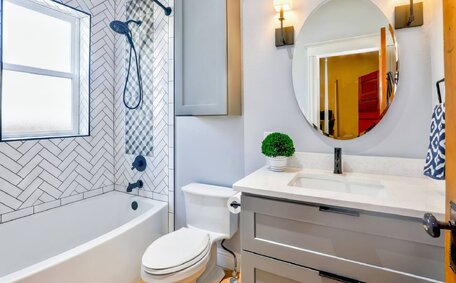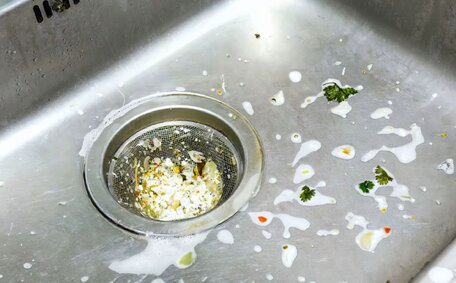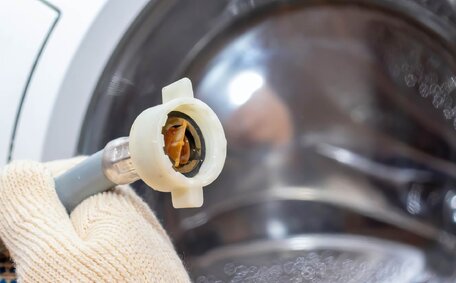How blocked drains reduce water flow and pressure
Blocked drains cause a marked drop in water flow and pressure in your plumbing system. Accumulation of debris, grease, and other materials in the pipes reduces their diameter, hindering effective water flow.
This buildup increases friction and turbulence as water attempts to squeeze through the narrower opening, restricting water circulation; Furthermore, this could escalate to more serious plumbing issues. Over time, drainage slows to a trickle, pressure drops, and you may experience issues like:
- Less water coming out of taps and showerheads is a sign of reduced water pressure affecting your household.
- Toilets that refill slowly or not at all may have drain blockages.
- Gurgling sounds as water struggles to drain
- Back up incidents and overflows which can trigger leaks and considerable damage as water is caught behind blockages
Ignoring low water pressure creates persistent clogs and can cause pipes to burst under the ongoing strain. Should you suspect water leak issues, be mindful that such concerns may place your pipes in jeopardy, potentially leading to a rupture from stress.
Professional drain cleaning to eliminate the sources of low water pressure can safeguard your sewer lines and avert extensive repairs later on.
Common causes of drain blockages affecting water pressure
Drain clogs stemming from several common culprits are often the cause of low water pressure:
- Accumulation of hair, soap scum, and debris - Hair, dirt, grime, and soap deposits can gradually coat pipe interiors, contributing to low pressure over time. This build-up, often unnoticed, can significantly reduce the internal diameter of pipes.
- Mineral deposits - Hard water contains mineral salts which, over time can get left behind, encrusting as water flows through pipes. These scale deposits can accumulate in your pipes, hindering the plumbing network and restricting the flow of water.
- Grease and oil - Fats, oils, and grease travel down drain but then solidify on pipe walls as they cool. The thickened grease can cause blockage issues in your drainage system.
- Intruding tree roots - Tree roots can be invasive as they worm their way into cracks and joints in exterior drainage pipes. As these roots expand, they impede water flow to your home.
Such obstructions force your plumbing to work harder, demonstrating how blocked drains influence the water system in your home. The added strain leads to noticeable drops in water pressure cause reduced effectiveness in your home fixtures.
Being vigilant about slow drainage and enlisting a local plumber’s help is key to preventing severe clogs and related water pressure problems. Promptly having a professional clear blocked obstructions also reduces the risk of sewer line damage from the stress of clogged drains.
Signs of blocked drains causing low water pressure
There are several telltale signs that may indicate your drains are blocked and negatively impacting your home’s water pressure:
- Low water flow - Reduced force from taps and showerheads suggests low water volume and calls for an immediate water pressure check. If water starts off strong but quickly weakens, this is a potential sign of waning water pressure, affecting fixtures like taps and showerheads.
- Toilets not refilling - After flushing, your municipal water issues may reveal themselves, a more common problem, when the toilet tank doesn’t fill all the way or takes much longer to refill. This often could due to obstructions in the sewer drain that runs from your home to the main sewer line.
- Gurgling noises - You may hear bubbling, swishing, or gargling sounds coming from drains and access points like floor vents. These noises occur as clogs restrict airflow through pipes, causing turbulence in pressure your home.
- Backups and slow drainage - You notice drains emptying slowly or pooling water as faucets and other fixtures struggle to evacuate water because of a clogged sewer line downstream.
- Sewage overflows - A blocked sewer line can cause stagnant water to collect and overflow basins and tubs when fixtures are used. Water may also rise up backyard drains.
Should you notice poor drainage and falling water pressure, it’s crucial to contact our expert plumbers promptly. Contact your local plumber professionals today; we can swiftly pinpoint, unclog, and repair affected drain lines to restore water pressure before lasting damage occurs.
DIY solutions for clearing blocked drains
Before calling a professional, locate your stop tap and try some DIY methods to resolve the blockage and increase water pressure:
- You can try using a drain snake or plunger - First, seal the overflow in your basin or bathroom sink, and identify the shutoff valve, before working to dislodge the blockage.
- Pour boiling water down the drain - This can melt grease, enabling the strong water current to dislodge blockages.
- Use a baking soda and vinegar mix - Merge equal parts of baking soda and vinegar, and pour the solution down the drain. Cover and give it time to work its magic, one thing can do to ensure a thorough clean, then wash it down with plenty of hot water.
- Employ a commercial chemical drain cleaner, selecting an enzyme digestion agent or a foaming solution and meticulously follow the instructions to address can clogged drain challenges.
Take care with DIY drain-clog remedies – protective gloves, goggles, and closed shoes are prudent precautions for the job. Always make sure your workspace is well-ventilated.
If DIY drain clearing does not yield improvement, our skilled professionals stand ready to properly diagnose and tackle issues obstructing your main water supply without harming your pipes.
Preventing blocked drains to maintain water pressure
Taking preventive steps can prevent drain blockages, ensuring a reliable water supply and consistent pressure in your plumbing. Here are some tips:
- Using basket strainers on sinks and tubs can guard drains against hair and debris, reducing future blockage risks.
- Dispose of excess fats, oils, and grease in a heat-resistant container outside of your home to prevent pipe blockages. It’s crucial not to discard them down your water pipes.
- Drain catchers in showers and baths trap hair and soap scum, preventing them from forming blockages.
- Conduct weekly drain cleaning by flushing your hot water system for 30 seconds to a minute to clear buildup.
- Use enzyme drain cleaners regularly to dissolve organic matter and maintain clear pipes.
- Keep trees and shrubbery well-pruned near water conduits to ensure roots can’t obstruct the pipeline.
- Replace old steel or clay pipes with smooth PVC piping to safeguard your main water lines against corrosion and buildup.
- Install pipe screens on exterior drains and vents to block leaves and debris from entering and safeguard your neighbours’ water flow.
- Consider having a water pressure regulator installed to help maintain high water quality and steady pressure.
Our team prioritises preventative measures to ensure free water drainage and optimal plumbing performance. Should DIY solutions fail to fix ongoing drainage or water pressure problems, seek our professional services for expert assistance.






